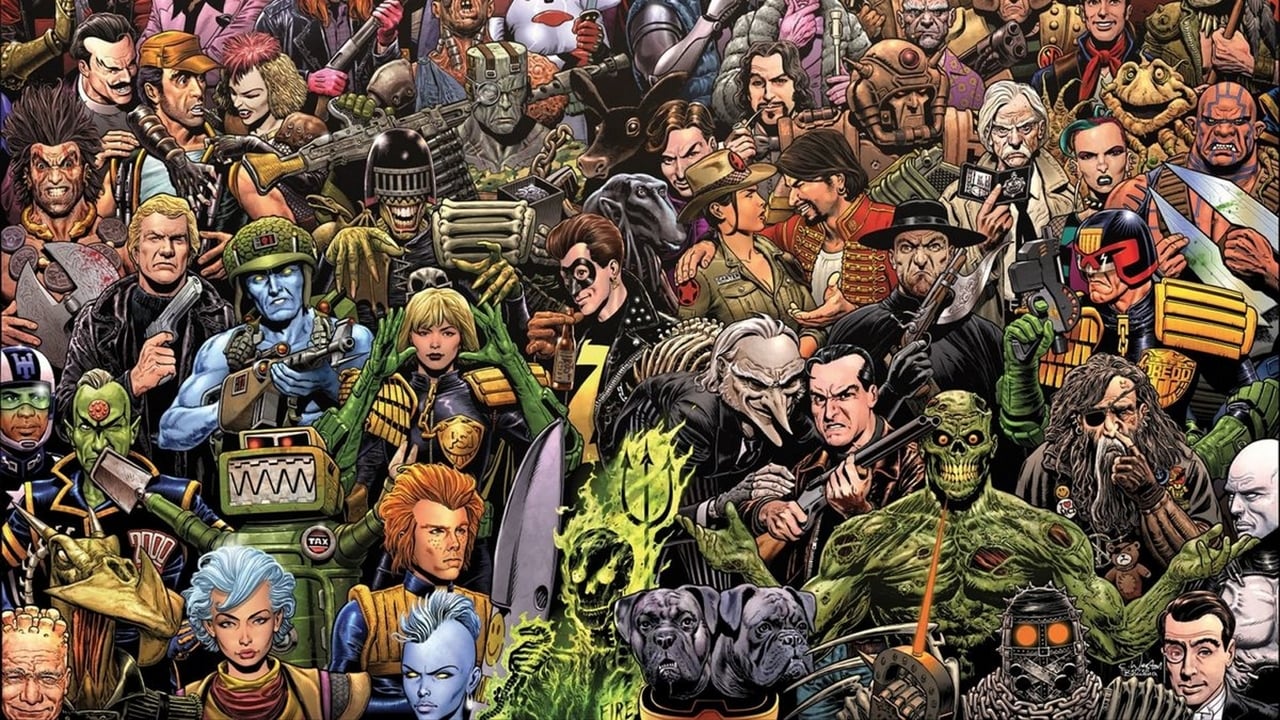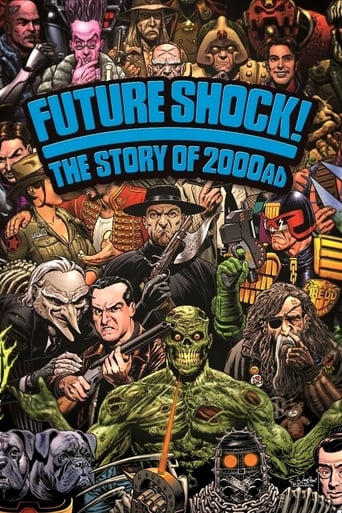ThedevilChoose
When a movie has you begging for it to end not even half way through it's pure crap. We've all seen this movie and this characters millions of times, nothing new in it. Don't waste your time.
Brennan Camacho
Mostly, the movie is committed to the value of a good time.
Jenni Devyn
Worth seeing just to witness how winsome it is.
a_chinn
Fun documentary talks to nearly all of the key folks who were part of 2000AD since the beginning, but I'm not sure if this documentary will be of all that much interest to anyone who's not already a fan of the seminal British sci-fi comic. For those unfamiliar, 2000AD was a punk rock comic book at time when comics were mostly routine superheroes and villains, inserting social commentary and controversial topics into a shockingly violent sci-fi stories. Judge Dreddd is the most famous character to come out of the comic, providing an interesting commentary on freedom, justice, democracy, and innumerable other contemporary issues, all set within a future United States that's been devastated by nuclear war and is now comprised of two "Mega Cities" on each coast and a wasteland between the two. In those cities the justice system has been streamlined where the Judges serve as the police, judge, jury, and executioner, issuing out instant justice on the streets. Dredd is less of a character and is more of a vehicle by which a variety of stories can be told around through the rich tapestry that comprises Mega City One. This film is less about Dredd or the major characters and series to come out of the book, but is more about the ups and downs of the comics' 50-plus year history, starting back in the late 1970s. I actually still collect the comic and it's awesome that a number of the original creators of the comic are still regularly creating content for the publication (John Wagner, who co-created Dredd, is still writing stories on a regular basis and is controlling the series main story arc). But on top of that, many of the new generation of popular creators who all grew up reading the original comics and are now the ones making their own cleaver, edgy, original content. It's a lot of fun to put a face and voice to these creators who I've read their names all these years and hear them tell their story of the comic (the most interesting moment in their history is hearing from Neil Gaiman and other how he, Alan Moore, and others left for DC and Marvel in the US, helping rejuvenate dull US comics the same way they did British comics). It's also fun to hear the original creators of the comic and the new generation of writers and artists talk about how the comic is still going strong now because they have embraced being a niche comic and are no longer worried about trying to appeal to a mass audience, as was a tried during a corporate takeover in the 90s that that when horribly wrong. On the downside to this documentary, I was already pretty familiar with the history of 2000AD from a lengthy series of articles included in the Judge Dredd Magazine several years ago, which meant that this documentary didn't provide any new information or new insights. Still, seeing the many creators in person talking about their history with the comic, many of whom have gone on to be icons in the industry, was enough to keep my interest and make this worth watching.
Chum griffin
At the age of 9 I read the very first edition of 2000ad in 1977 and continued to enjoy the dark comic reality show until the late 1990s. This documentary was interesting . It did have several flaws for me. I wanted to hear about the character development more and the story lines. But, and everything that comes after but is usually bullshit, but in this case it is not:-) I see this documentary as a story of artists disenfranchised, and as such it is merely a another dark story, albeit uninspiring and just sad . Apologies if my judgement upsets you mere mortals
morrison-dylan-fan
1995:Going to the NEC in Birmingham for a comic convention with my dad,I got given £10 and told that I could spend it on anything I want.Looking round,I spotted amongst the comic sellers two huge robots that you could have a photo taken with.Getting on the stage,I was a bit surprised when someone dressed as a futuristic cop joined for the photo.2016:Since learning the futuristic cop is Judge Dredd,I have read the occasional issue of 2000AD, and have also been a big fan of the 2012 Dredd movie (although I've still not seen the 1995 film that was getting hyped up at the NEC!) After reading an excellent review from a fellow IMDber about a doc on 2000AD a while ago,I was happy to find out from another IMDber that the doc was on Channel 4's 4OD service,which led to me getting ready to go back to the year 2000AD.The outline of the doc:Frustrated over the twee nature of boys British comics, Kelvin Gosnell and Pat Mills decided to create a comic inspired by Punk Rock called Action,which would feature explosive action and hard- edge satirical shots.After gaining a little too much controversy,Action comic was closed down.Wanting to find a way to continue the themes that were started in Action,Gosnell & Mills work with John Wagner to plan a Sci-Fi comic. Believing the comic would be short-lived,Gosnell,Mills and Wagner decide to name the comic:2000AD.View on the film:Revealing the foundation from which 200AD came from with news footage and Punk Rock songs,director Paul Goodwin separates the sections of the doc with 3D,slightly animated versions of 200AD artwork,which gives the film a wonderfully pulpy vibe.Whilst the shifts in viewing the history of 2000AD are slightly jarring,Goodwin smooths things over by offering eyefuls of prime cut artwork from 2000AD history.For the interviews,Goodwin covers an impressively wide ground which goes from the creators to those who the comic has inspired (such as film maker Alex Garland,who used 2000AD artist "Jock" to design the main robot in Ex_Machina.) Offering each of the interviewees plenty of breathing space,Goodwin taps into the Punk spirit of the comic,by letting everyone be as blunt as they want on the rise,fall and rise of a comic which has been handing out "justice" for decades.
Red-Barracuda
I used to buy 2000AD myself back in the mid 80's. I remember it clearly was a cut above the rest of the comics of the time (with the noticeable exception of Warrior magazine which was aimed at a slightly older readership and was the comic that launched Alan Moore's 'V For Vendetta'; sadly there is no reference to Warrior in this documentary which is a shame given that it was a hugely influential British comic in itself). Anyway I digress, 2000AD emerged in the late 70's and this film draws parallels to its birth and the rise of punk rock. I suppose they both were coming from similar places looking back on it, with the anarchic, satirical tone of the comic coming from a similar ball-park to the anger of the music. The documentary focuses a lot on the many ways in which 2000AD differentiated itself from the other boy's comics of the time and it is definitely true that it was coming from a decidedly more original place than the likes of Victor or Warlord. Its true progenitor was Action, however, which was a comic I vaguely remember, which featured strips such as 'Hook Jaw' whose anti-hero was a great white shark that went around eating unscrupulous human beings. The problem Action had was its violent and satirical tone was based around stories set in a more recognisable world and so it was too close to the knuckle and was ultimately banned. Editor Pat Mills decided to make a new comic and he adopted a tactic that Hammer Studios had twenty years before, when they started to bring gory horror films to the British cinemas. They did so by setting the stories in the 19th century and basing them around the supernatural, this distancing measure led the censors of the day to pass them uncut; what 2000AD did was retain the attitude of Action but to give it the distancing element of science fiction. And with this, a British institution was born.The comic was decidedly different from the American equivalents which focused on superheroes. The characters 2000AD introduced seemed altogether more unusual and original. More specifically, what 2000AD brought to comics was the anti-hero. Their flagship character Judge Dredd was the most obvious example of this, while he fought crime he did so in an extremely heavy-handed and fascistic manner as a member of a police force working under a dystopian state. Set in the USA, this character was a British version of America, in a similar way to how the spaghetti westerns of the 60's were Italian versions of the Old West; consequently because they were coming from a different culture both the spaghetti westerns and Judge Dredd were wilfully more cynical and violent versions of America than we had typically seen. The documentary talks a lot about the violence in the comic but I wondered if it might have been not being able to see the woods for the trees a little bit, as while the comic had a violent element, I don't remember actually buying it for this reason. It was more because of the highly imaginative and original stories such as Nemesis the Warlock, Sláine, Strontium Dog, Rogue Trooper, The Ballad of Halo Jones, Ace Trucking Co., D.R. and Quinch etc etc etc. The freedom the comic offered led to lots of creativity and attracted some highly respected writers and artists to develop very interesting comic strips. Sadly, and perhaps inevitably, many left to work for the American comics from the late 80's onwards and 2000AD went through hard times in the 90's as a consequence. The film touches upon some of the anger and frustration of this time and it seems it went close to folding. Fortunately it surfed the bad times and still runs to this day, almost forty years after its inception. This film has a lot of energy and passion about it, with many people associated with the comic on hand to give recollections. It sometimes labours certain points perhaps to breaking point but it tries its best to cover as much ground as possible and succeeds in being both entertaining and informative about one of the most cherished long-running British institutions and exports we have.

